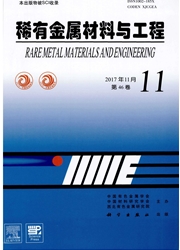

 中文摘要:
中文摘要:
以316L不锈钢纤维毡为原料,采用不同的烧结工艺,制备出孔隙度为70%~95%的不锈钢纤维多孔材料,研究了纤维丝径、孔隙度、烧结温度和保温时间对其拉伸性能的影响。研究表明,不锈钢纤维多孔材料的拉伸过程主要分为3个阶段:弹性阶段、塑性变形阶段和断裂阶段。纤维越细,多孔材料的抗拉强度越高;随着孔隙度的增加,多孔材料的抗拉强度逐渐降低;提高烧结温度或延长保温时间,均会提高多孔材料的抗拉强度。
 英文摘要:
英文摘要:
316L stainless steel fiber felt was used as raw material and the porous materials with porosity of 70%-95% were prepared by different sintering techniques. Furthermore, the effects of diameter of fiber, porosity, sintering temperature and holding time on tensile strength were investigated. The results indicate that the tensile process of the porous materials with stainless steel fiber can be divided into three stages: elastic stage, plastic deformation stage and fracture stage. Moreover, the tensile strength gradually decreases with the increasing of the diameter of fiber and porosity. In addition, the tensile strength of porous materials increases with the sintering temperature or holding time increasing.
 同期刊论文项目
同期刊论文项目
 同项目期刊论文
同项目期刊论文
 期刊信息
期刊信息
